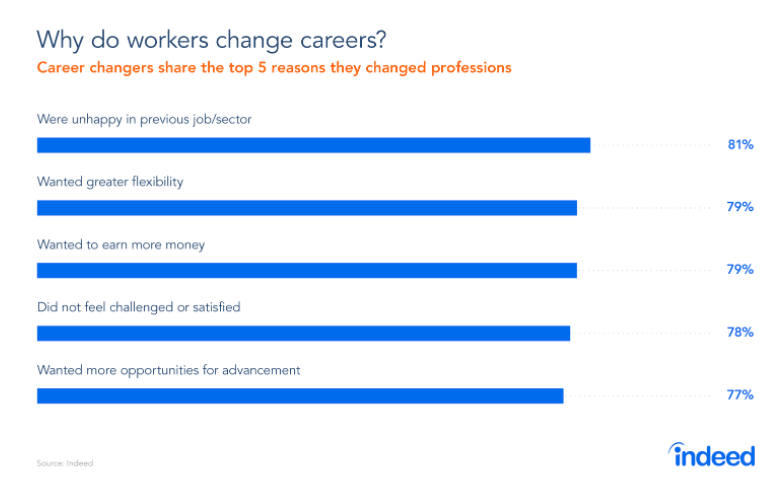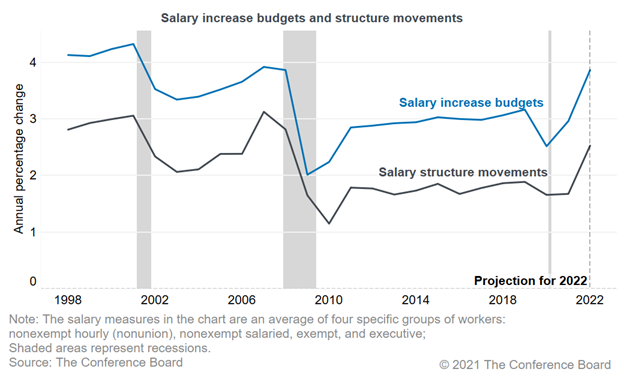An unprecedented number of people left their jobs between April and November 2021, so many that economists called it “The Great Resignation”. Yet many people had already considered changing careers before the pandemic, for various reasons.
Some reasons people change professions include low pay, frustration with working relationships in the office, anxiety, stress from looming deadlines, and working long and unsociable hours.
This quick guide explores three common reasons people switch careers. After that, we’ll discuss another reason that has been making news recently; “The Great Reassessment”.
People Are Actively Considering A Career Change
Picture this. Almost half of the respondents to an Indeed survey said they made a “dramatic career change” in 2019. The findings may represent what was going on before the “new normal” in 2020. According to another study, about one in three people have changed their careers since starting their first job after college.
Here’s the kicker. Around 70% of all employed individuals are searching for a new job. About 58% of workers said they would take a pay cut to completely change fields, such as engineering to teaching or marketing to healthcare.
Even so, people don’t just stop working.

Chart source: Indeed
According to the Indeed survey, 83% percent of employees took about 11 months to decide before making a total career change. So again, many people had already contemplated changing their careers before the pandemic hit.
But why?
What are the reasons for a career change?
We’ve put together some insights backed up by statistics.
1. People Change Careers to Increase their Salaries
Although Indeed found that almost 60% of employees would take a pay cut to switch careers, other recent studies show that getting a better salary is one of the most compelling reasons to do so.
But Indeed’s survey acknowledges that 79% of employees considered changing careers to earn more money.
More than 17,000 employees across 19 industries took part in the Workplace Health Survey from June 2015 through March 2017. The results showed that a startling 79% of respondents felt they were not compensated enough for their contributions.
Likewise, EdX’s research shows that 1 in 4 people changed careers to earn a higher salary.
In addition, half of the respondents told FlexJobs that making more was a big reason they were considering or had already changed their profession.
The May 2021 PwC survey findings suggest that many people still want more perks and benefits.
Since wage growth has lagged behind the cost of living for years, this makes sense. Executives are aware of this and are responding accordingly.
According to the Labor Department, wages and salaries increased 1.5% in the three months leading up to September 2021, compared to the same period in 2020. Compared to a year earlier, wage growth was higher than inflation (1.2%). This high coincided with a record number of resignations in the United States in September. Experts predict wages and salaries will keep rising in 2022 – faster than the cost of living – resulting in the highest wage and salary increases in over a decade.

Source: The Conference Board ©2021
2. Employees Who Work in Stressful Careers Are Less Likely to Stick with Them
Seventy-four percent of the Workplace Health Survey respondents said they felt micromanaged and hindered by trivial tasks at work. Furthermore, 65% of respondents said their work environment was hostile, unhelpful, and isolating.
High-stress careers typically involve:
- Long hours or odd hours, or both
- Shouter bosses
- Inadequate recognition for contributions
- Deadlines that cause anxiety with no rewards for achieving goals on time
- Corporate politics
- Job insecurity
A study of 9 million employee records across more than 4,000 companies found that employees consider changing jobs and careers when they struggle to keep a healthy work-life balance, keep themselves safe at work, and handle excessive workloads.
It appears many health workers left the profession in droves in 2020/2021 due to fears of contracting Coronavirus while on the job. Others quit after long periods of intense demands that pushed them to the limit.
3. People Change Careers in Pursuit of Growth

Approximately one in three people change a job, or even a career, when they lack the opportunity to practice their current skills and talents, according to a 10-year study (2005-2015) involving more than 8,000 respondents in various companies, locations, job positions, and industries.
It is also possible that you are in a career with little room for growth.
It is noteworthy that mid-career employees have resigned at a higher rate over the last two years than their younger peers, who historically have resigned at a higher rate.
Resigning employees in 2020 and 2021 were, on average, 39 years of age. According to Visier’s report, those between 30 and 45 years felt stagnant at the mid-career point and resigned in search of new opportunities.
But couldn’t these employees have found new jobs rather than changing careers?
Here’s an interesting take.
In its Business Formation Statistics report for 2021, the Census Bureau noted record numbers of applications to start new businesses.
As of July, it had received nearly 1 million applications, which coincided with a record number of resignations. More mid-career employees may be transitioning from workers to business owners, something they may have wanted to do all along.
Furthermore, Indeed found that 78% of people who quit wanted more challenges, while 77% wanted more advancement opportunities.
That’s one example.
Considering you must learn new skills without in-person training, you might also want to switch from a field where moving to hybrid and remote working feels stressful. Thus, you might consider working in another field that is more traditional or less hectic.
4. Priorities Shifted After the Pandemic
The last two years brought The Great Reassessment. Here’s how.
Many people have worked continuously and hard since the 2008 recession. People often worked 60-hour weeks.
When the pandemic hit and governments imposed lockdowns, these people reassessed what they were passionate about, their hobbies, and their purpose in life.
You probably experienced the same thing. If you spent more time with loved ones, developed a creative hobby, or joined a fitness program, your values have likely changed.
You realize you need less stress in your life.
You long for more flexibility and for a career that aligns with your highest aspirations.
Maybe you know nothing is guaranteed, and you could lose a job or a promising career in weeks. You appreciate that life can end abruptly, so you’ve decided to live your dreams to the fullest while you can. You may have wanted to move outside the city, where it is cheaper, quieter, greener, and more conducive to outdoor living. A recent study from George Mason University’s Post-Schar School of Policy and Government reported that 28% of US adults have seriously considered moving to a place with a different lifestyle since the pandemic began.
If you think about changing a career but don’t know how then ask yourself these 7 key questions.
Disclaimer : The information provided in this site is for educational purposes only, and it is not a substitue for professional advice. The article may contain affiliate links. See the full disclaimer for more details.
Shachar is a blogger and sensitive person who worked in a recruitment company and holds a master’s degree in sociology. After years of struggles to find purpose, he made this blog to help others find their purpose more efficiently. He likes to play chess, walk in nature, and take photos in his free time.


